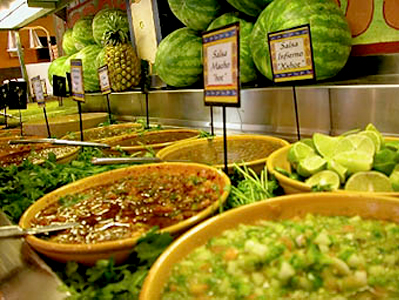
Local group promotes green vision for business and community ---
Jorge Saldaña, owner, chef, and farmer behind Cancun restaurant in Berkeley, can still picture his mother in his family’s kitchen cooking for him and his nine siblings. Originally from Guadalajara Mexico, Saldaña dedicated many meals to perfecting the taste of his mother’s home-cooked dishes. He is also dedicated to using the freshest ingredients, which are delivered from his organic farm in Sonoma.
“Cancun is a Mexican restaurant with all 100 percent natural ingredients,” says Saldaña, who opened the restaurant in 1994. “We became conscious about the earth and the pollution, so we were recycling the garbage,” he explains about the restaurant´s first steps in becoming a green business.
Today, Saldaña´s restaurant is not only a popular eating place in the East Bay, but also an Alameda County Certified Green Business. To become certified, businesses need to conserve resources, prevent pollution, and reduce waste. Specifically, a business must verify that it complies with environmental regulations. Some actions businesses take include:
• buying only recycled-content paper and copying double-sided
• cleaning with less toxic products
• using efficient lighting systems
• installing low-flow toilets and faucet aerators
“Hispanics are very interested to see what they can do to be more responsible for the environment - they are very open to these ideas,” says Carolina Miranda, a green business consultant and a board member of the Sustainable Business Alliance (SBA) in Berkeley.
SBA is a business association working to build a vibrant community of locally-owned, sustainably-minded businesses in the East Bay. Its vision is for an East Bay network of business, community residents, and government engaged in actions that benefit the local economy, social equity, the environment, and quality of life.
SBA provides its diverse membership of more than 250 local businesses with opportunities for networking, business development, and learning best practices for operating sustainably. They also educate the public on the benefits of local living economies and encourage residents and businesses to spend locally.
Miranda points out that Hispanic-owned businesses are very similar to other businesses when it comes to going green. “We are dealing with small businesses where the owners are doing everything themselves and are strapped for time and cash,” she says.
“In Fruitvale, with the high levels of crime, it can be difficult for the owner to look at other areas of their business.”
Miranda adds that it can be a challenge for businesses that go green to offer products that are price competitive against products that are non-green.
“Some consumers are willing to pay that premium and some are not,” she says. “They need to look if their market is going to be willing to pay that or not. Many business owners I talk to are very interested because they see that it can create a competitive advantage for their business in addition to being more responsible to the environment and community.”

